#torah portions
Text
youtube
#torah#scriptures#torah portion#talmud#torah observant#torah observant christianity#bible translations#new english translation of the septuagint#the tanak#greek bible#greek translation#the seventy#the creation gospel#torah portions#feast days#hebraic roots#old testament#septuagint#fe#Youtube
6 notes
·
View notes
Text
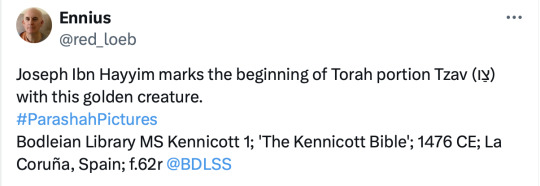

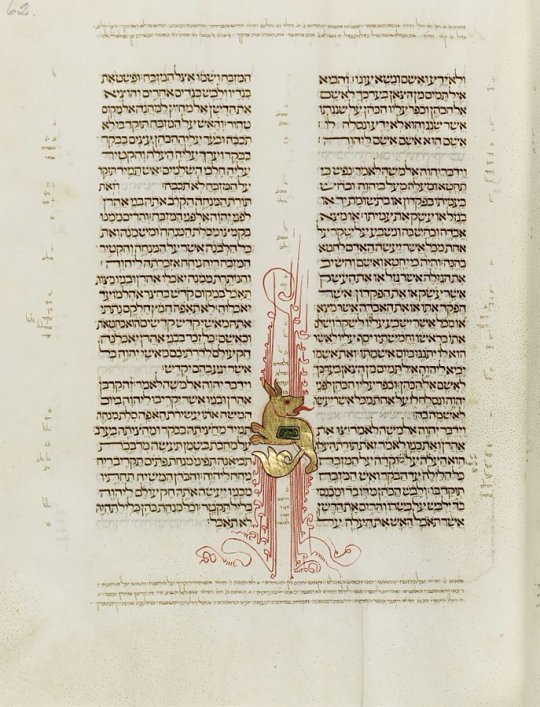
#Torah portion Tzav (צַו)#ParashahPictures#The Kennicott Bible#476 CE; La Coruña#Spain#Judaism#Jumblr
84 notes
·
View notes
Text

Genesis 4:8-12
And Cain spoke to Abel his brother, and it came to pass when they were in the field, that Cain rose up against Abel his brother and slew him.
And the Lord said to Cain, "Where is Abel your brother?" And he said, "I do not know. Am I my brother's keeper?"
And He said, "What have you done? Hark! Your brother's blood cries out to Me from the earth.
And now, you are cursed even more than the ground, which opened its mouth to take your brother's blood from your hand.
When you till the soil, it will not continue to give its strength to you; you shall be a wanderer and an exile in the land.”
———
As a Palestinian Jew, the ongoing genocide makes my heart ache with a pain unimaginable.
October 7th was Simchat Torah, which starts the Torah over with Bereshit. The story of Adam and Eve, and of Cain and Abel. I personally found a parallel between the Cain and Abel story and the Palestinian Genocide.
Along the top and side are traditional Palestinian embroidery patterns. In both Arabic and Hebrew the middle says “From the River to the Sea.”
#palestine#from the river to the sea palestine will be free#jewish#jewish art#israel#art#artists on tumblr#bible quote#simchat torah#torah portion#from the river to the sea#cain and abel#bereshit
73 notes
·
View notes
Text
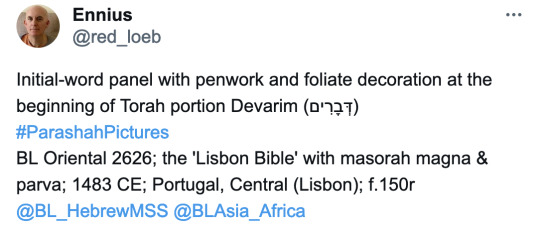
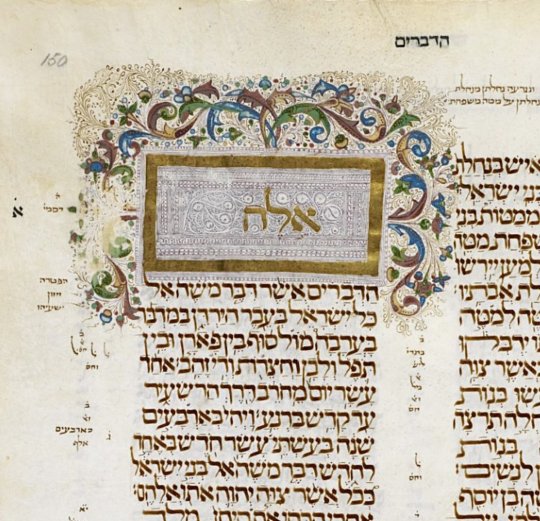
97 notes
·
View notes
Text
fuck zodiac signs what was your bar/bat/b'nai mitzah torah portion (parsha)???
#mine was lech-lecha#jumblr#judaism#bar mitzvah#bat mitzvah#torah#torah portion#parsha#jewish#zodiac#signs#zodiac signs
222 notes
·
View notes
Note
someone asked the person who make the tweet if they have proof that sap is antisemetic and they literally said ‘no but there’s probably something’
what is wrong with people
#these children need to get off twitter and finish studying their torah portion !!#i wonder how one could make their haftorah about sapnap kick#askies#negative
33 notes
·
View notes
Text
On Haftorahs (particularly on last week's)
Every week on Shabbat in shul we read a Torah portion, such that over the course of the year we will get through the entire Torah.
For each Torah portion there is an associated Hafotrah, which a section from another of the books of tanach that has some associated theme in common with the Torah portion that was read (with some exceptions).
There are a total of about 82 Haftorahs (I did a quick google, couldn't find a def. answer, so running off of memory).
Wait, you ask, there are like 52 weeks in a year. Even if you add an extra month, you still only get to 56. How are there 82?
Well, I answer, all the major holidays have there own torah portion and haftorah, and if they fall on shabbat their haftora superceeds the normal one.
Along with chol hamoed, minor holidays, and several other events that can occur.
So you never read all 82 in one year.
Now this leads to something interesting, due to how the calendar works, some haftorahs are rarer than others.
Miketz (the one we just had), usually falls during Hanuka, in fact on average it is only not on Hanukah once every 10 years!
So usually it gets supplanted by Chanuka's hafotrah (well, one of them).
It's a classic story too!
It's the one about Solomon, the baby, and the 2 mothers!
and we won't read it (in shul at least) for another 17 years!
How bonkers is that?
#torah#jumblr#judaism#haftorah#haftarah#chanukah#hanukkah#solomon#shabbat#there are portions with no thematic relation#mainly those around tisha b'av#which are instead related to tishab'av itself
19 notes
·
View notes
Text
"Take care of your soul as you take care of your body"
-Rab. Yonatan Galed
#jumblr#torah study#biblia#parasha ha shavua#shalom#torah portion#youtube#shabbat shalom#rab. yonatan galed#phrase of the day#words of emuna#emunah#torah#rabbi
65 notes
·
View notes
Text
Wait until some of the folks in the tags find out that bats were considered birds until Linnaeus....
29 notes
·
View notes
Text
the two trees
(reposted from Twitter)

Been reading a lot about religious abuse and a lot of people writing about it talk a lot about Eden and the trees, and I'm feeling like it's time for a little thread about the trees.
So. Everyone knows this story, right?
Cool. Where was each tree located in the garden?
Here's the text. (Incidentally, "Eden" is the same word, essentially, as "edna", pleasure--when Sarah hears the promise that she will bear a son, she laughs to herself at the idea that she will have "pleasure", eden/edna, again.)
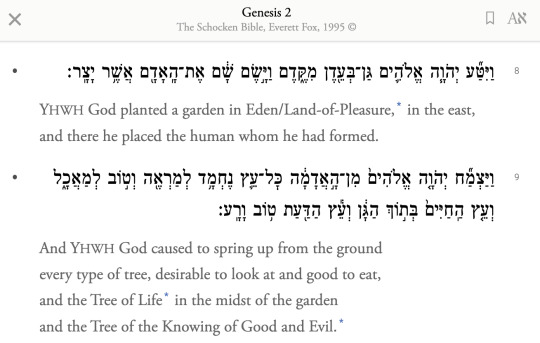
And here it is in a different translation (Hebrew and English are so different that it’s hard for a single English translation to capture everything about the Hebrew--in this case, while I generally prefer Everett Fox’s translation, it doesn’t capture the link between adam (the human) and adamah (the earth/soil).
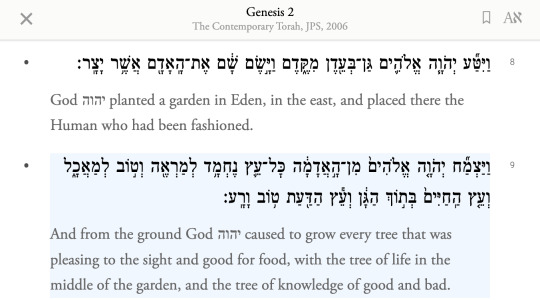
They both basically preserve the structure of the Hebrew as far as where the trees are: “the tree of life in the center of the garden... and the tree of knowledge of good and bad.”
So in the center, we have the tree of life.
And... somewhere, there's also the tree of knowledge. (Tov v'ra, "good and bad," is an idiom that means "everything"--the English equivalent would probably be closer to "Knowledge from A-Z”.)
Ok, so, we've got the tree of life called out as being at the center of the garden. And somewhere in the garden is the tree of knowledge. And then we get instructions.
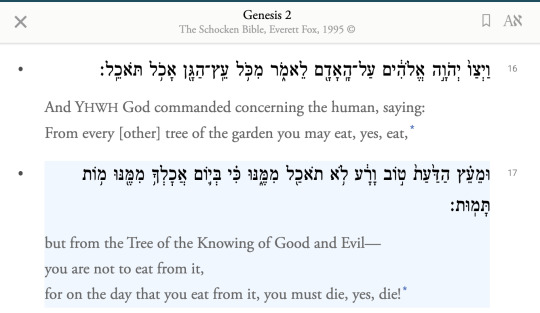
So if you want to read this literally in English, these instructions are given to Adam, because Eve isn't around yet. But as I noted above, adam in Hebrew is also just "human." (adam from the adama, an earthling from the earth, a human from the humus.)
And there's a popular Jewish reading that says that the first human was actually male AND female, and Eve wasn't *created* from Adam--the first human was split into two. So maybe she was around. But if you want to be literal, the text only records this instruction to the man.
Anyhow, we have the tree of life in the center, and the tree of knowledge somewhere, and the man gets told don't eat from the tree of knowledge, and Eve doesn't exist yet (at least as a separate being).
So, Eve gets separated/created, and along comes the serpent, with a question that is already framed incorrectly (a tried and true lawyer technique--people will jump to correct you and accidentally admit things). “Did God really say: You shall not eat of any tree of the garden?”

So, we don't know what Eve has actually been told, or by whom. Did God give her the same instruction God gave Adam? Did Adam have to pass on the instruction to her? Did he do it correctly?
So let's look at her answer:

What’s interesting here is that while the translation inserts the “other” to make it make sense, it’s not there in Hebrew.
What’s even odder is that the first sentence is actually in the singular:
and said the woman to the serpent from the tree-of-the-garden we will eat
is the closest I can get to word-by-word, one-to-one translation.
It should be in the plural construct form, atzei-, but instead it’s in the singular, etz-.
Then she goes on:
and/but from the fruit of the tree that is inside/in the center of/the essence of the garden, said God do not eat from it and do not touch it lest you die
So, first, let's get something out of the way: she adds to the instruction. The original instruction didn't contain anything about touching.
(And if you're going, eh, so what?, well, the Hebrew here is SUPER-terse. If something gets repeated, it's significant. And if it gets repeated with a change, that change basically has flashing lights over it.)
So either:
God gave Eve different instructions (Adam wasn't told not to touch; she was).
Adam relayed the instructions to Eve and added the part about not touching.
Eve added the part about not touching.
If the story wanted us to know that God gave Eve different instructions than God gave Adam, I'm pretty sure we would have gotten a scene with that.
So either Adam or Eve engaged in the first instance of the rabbinic practice of "building a fence around the law”. The practice of building a fence around the law is, if the Torah says "don't cook a kid in its mother's milk," you don't eat milk and meat together just to be sure. It makes the law stricter. (BTW, for Christians: Jesus was super-into the rabbinic practice of building a fence around the Torah--if the law is "don't murder," he says don't even get angry with someone.)
And the instruction is changed in another way:
God tells Adam don't eat from the tree of knowledge.
Eve says we're not supposed to eat from the tree in the center of the garden (which has already been identified as the tree of life in 2:9).
So, the serpent says, you're not going to die, your eyes are going to be opened and you'll be like divine beings, knowing tov v'ra (literally good and bad, but colloquially, everything from A-Z).
And so she eats from... the tree. The tree in the center of the garden? The tree of knowledge? Nope. Just the tree.

Oh, and btw, the text is literally: she took from its fruit and ate and gave also to her husband THERE WITH HER (imah) and he ate. This entire time, the shmuck was standing right there not saying anything. All those stories about her running off to find him and seduce him? Heh.
Funny how the majority of translations just... don't translate that word.
So anyway, God asks them if they ate from the tree God had commanded them not to eat from (God initially identifies the tree of knowledge, Eve identifies the tree in the center of the garden--it's like the text is doing a shell game with the trees.).
There's a lot I could say about how bad the "pangs of childbirth" translation is (it's work, an explicit parallel to Adam's work of tilling the soil). Equal weariness for equal work, but that's a whole different discussion.
But then we get God speaking (unclear to whom, or who can hear), saying "we can't let them also eat from the tree of life" or... they'll live forever. But they were already eating from that tree, no? They had permission to eat from everything except the tree of knowledge.
So what's going on? Midrash goes WILD about the trees. It was two trees with a single root system, it was the same tree, one tree was the root system of the other, etc. I haven't encountered it, but there's probably stuff about the trees switching places somewhere.
Kabbalah, Jewish mysticism, goes even WILDER, collapsing space and time. Adam and Eve were originally a single being, and so were Lilith and Samael, and those two in their combined form were the tree of knowledge, they got split when the fruit was plucked, which is why Lilith is so pissed.
But also, the serpent was Samael and the tree was Lilith, there's stuff I can't remember exactly with the tree and the flaming sword of the cherub guarding the way back to the garden being somehow related... Jewish mysticism doesn't always treat time as linear, so.
But I keep coming back to those two instances of:
Eden as paradise.
Sarah laughing to herself at the idea that she will have pleasure (edna) again in her old age. It's a root that doesn't occur all that often, so the link between those two instances rings out.
And you can read the text as God imposing punishment, like a vengeful parent. You can also read it with God as an overprotective parent, who wanted to keep the knowledge of what inevitably awaits adults--toil, exhaustion, and ultimately death--from the kids for a little longer.
But adulthood holds joys kids can't experience, too, like the joy of bringing life into the world. And birth is intimately connected with death. They are inextricably linked, the departure from the garden of Eden into the world of toil and death, and Sarah’s edna at the idea she will have a child.
As bioethicist Laurie Zoloth observes in Born Again: Faith and Yearning in the Cloning Debate:
Birth, in its messy, uncontrollable tumult, is the closest moment we ever have to facing our own death, of course. The Jewish rabbinic tradition requires women to re-enact this by the ritual immersion and the public recitation of the prayer of rescue, both acknowledgments not only of the obvious risk involved in physical childbirth (a fact rather cheerily forgotten in all of the cloning debates) but also of the fact that the birth of a child re-states the ending of the self. It is the entrance into the room of your life of the he-who-will-hold-you-as-you-lie-dying...
At stake will be how it is to love like that, not the chosen one, not the close-as-can-be replica, but the surprising stranger who will live at your side... The act of parenting is the act of encounter with the other who is both not-you and of-you, your future and your responsibility, your obligation and your joy. In this way, we all learn to have the stranger, not the copy, live by our side as though out of our side.
God is not a human parent, but perhaps the departure from Eden is the moment when humanity becomes the beloved stranger, who is both not-God and of-God, future and responsibility, obligation and joy.
I think here of one of our readings for Yom Kippur here:
You are our Beacon;
we are Your burden.
You are our Enigma;
we are Your frustration.
You are our Call to Conscience;
we are Your critics.
You are our Touchstone;
we are Your loyal opposition.
Perhaps as a species, we’re still teenagers.
What the link between birth and death, expulsion from paradise and the promise of a child, seems to tell us is that they’re the same tree.
Life beyond childhood and knowledge and death are all of a piece. Or, you can read it as both of those concepts--life/innocence and knowledge/death playing peekaboo with you throughout the text.
But in any case, textually speaking, there is something VERY WEIRD going on with the relationship between those two trees.
And, most importantly, there is NOTHING simple about this story. It can't be read literally, and it's too mysterious to serve as a just-so story about men and women.
Photo credit: Johannes Plenio
143 notes
·
View notes
Text
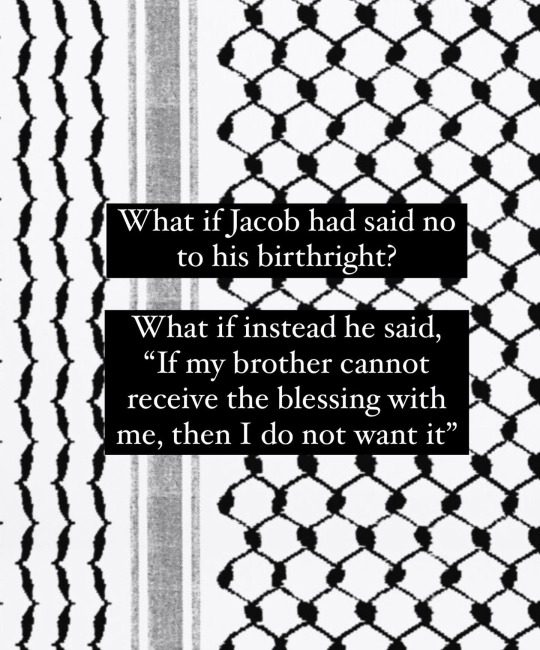
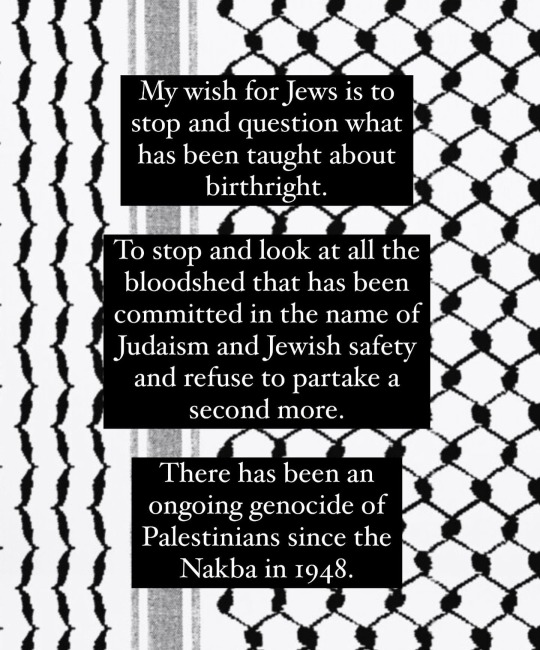
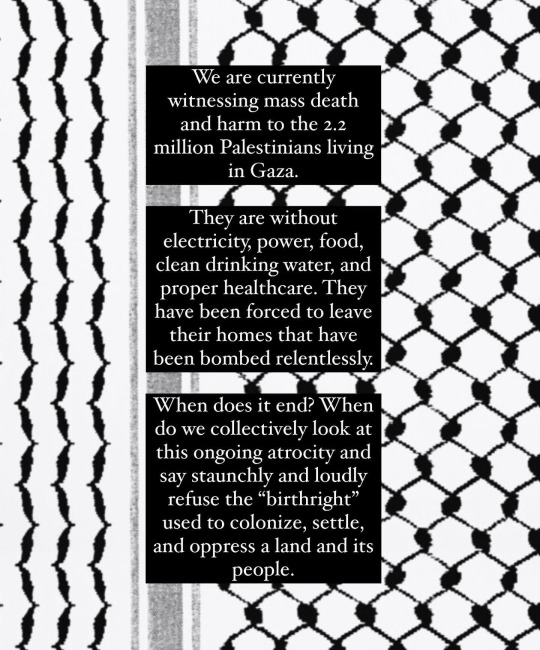
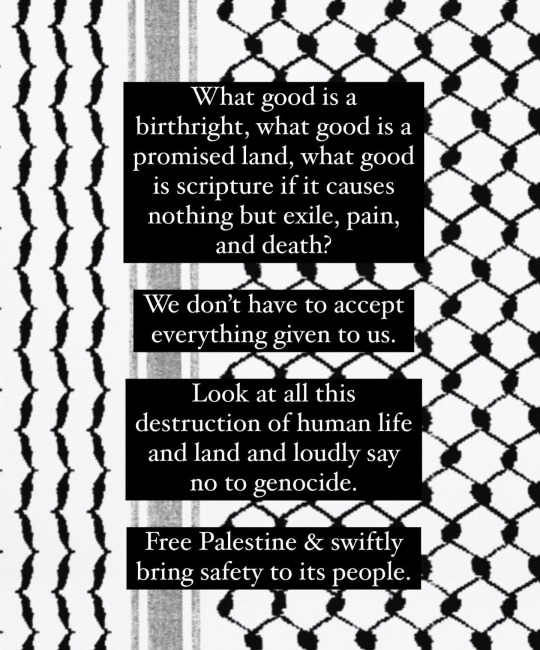
What good is a birthright
#free palestine#judaism#text post#parashat toldot#torah portion#anti colonialism#anti zionism#save palestine#palestine#jewish commentary
19 notes
·
View notes
Text
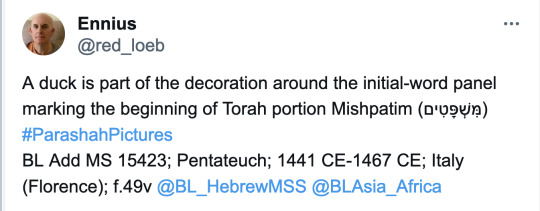

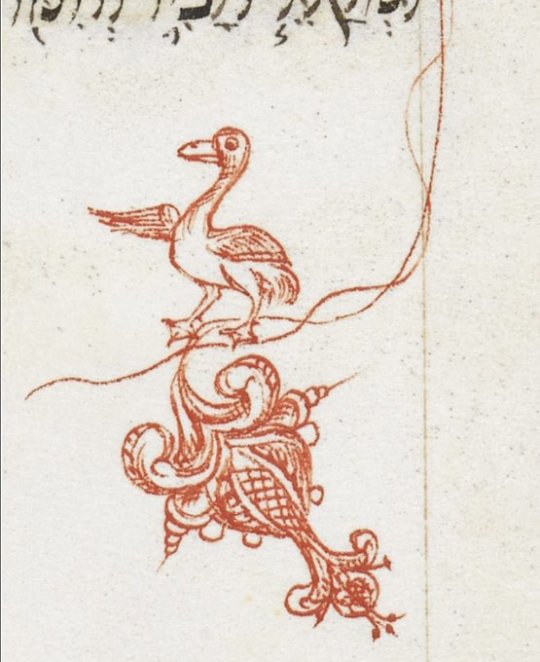
117 notes
·
View notes
Text
צדק צדק תרדף
justice, justice
it is somewhere ahead
just out of sight
around the bend in the arc of the universe
close enough to dream of
but too far to see
let alone to touch
or to hold
we have been chasing this
(this dream;
this hope;
this future)
for lifetimes
yet still
it escapes us
~
I am not, by nature, a hunter
my vision is poor
my heart is weak
and my legs tire easily
yet the quarry is out there
somewhere just ahead
I shall not give up
the pursuit
#poetry#poem#jewish poetry#dandelion poetry#jumblr#judaism#justice#pursuing justice#in honor of yesterday's torah portion#parshat shoftim#jewish dandelion
16 notes
·
View notes
Text
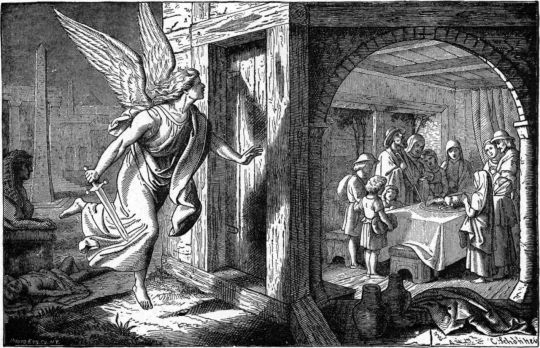
HOME SWEET HOME
In this week’s Torah portion, Bo, the Jews are commanded to prepare the Passover sacrifices and celebrate with matzah and bitter herbs the night before leaving Egypt. Unlike later Passover offerings which take place in the Mishkan and the Holy Temple, the very first Passover sacrifice does not happen in a central location but rather in each Jewish family’s private residence. The Israelites are commanded to remain within their homes all night and to put blood on the doorposts, in order to protect them from the Angel of Death killing the Egyptian first-born. But the Jews don't need to take these extra precautions to protect them from the previous plagues, so why are they required now, during the final plague?
By following God’s commandment to stay home and mark the doorpost with sacrificial blood, the Israelites make their homes part of the mitzvah. The message from God to the Jewish people, transmitted in their final hours of slavery, is that every Jewish home is holy. Our mission as Jews is to elevate the mundane and bring heaven down to earth. We do not require towering monuments or majestic cathedrals to be close to God. The center of our religion is the home. When a Jewish woman lights Shabbat candles, when a Jewish man makes the blessing over wine on Friday night, when a Jewish family hosts a Passover seder, they turn their humble abode into a resting place for the Divine Presence. So too we must transform every part of this world into a place of peace and serenity, a fitting home for God.
Image: The Angel of Death and the First Passover by C. Foster, 1897
Accidental Talmudist
18 notes
·
View notes
Text
At morning services for Yom Kippur, my rabbi said something about how Judaism is time travel. He mentioned how when you read the Talmud, and see both the original text and centuries worth of annotations, you are witnessing conversations through time. And when we say that we are speaking to everyone present and everyone who isn’t, we don’t just mean the people who can’t physically be here, we mean the people who aren’t here yet.
And, somehow, I think this is what I really love about Spinning Silver. Miryem doesn’t just speak to me because she’s a Jewish woman and it’s good to feel represented, somehow the experience of reading a book (and a fun fantasy book that I genuinely enjoy for many reasons) that so vividly and lovingly describes the lives and the religion of Jews from another time feels to me just the tiniest bit like time travel.
#my rabbi ended this by asking if anyone had seen back to the future#and when the congregation (largely college students) said yes he said#that makes me happier than reading Torah portions#spinning silver#naomi novik#miryem mandelstam#judaism#jewish#theology#jewish women
87 notes
·
View notes
Text
Exodus 18-20:23
Now Jethro, the priest of Midian, Moses’ father-in-law, heard about everything that God had done for Moses and for Israel His people, how the LORD had brought Israel out of Egypt.
2And Jethro, Moses’ father-in-law, took in Moses’ wife Zipporah, after he had sent her away,
3and her two sons, fnone of whom was named Gershom, for Moses said, “I have been a stranger in a foreign land.”
4And fnthe other was named fnEliezer, for he said, “The God of my father was my help, and saved me from the sword of Pharaoh.”
5¶
Then Jethro, Moses’ father-in-law, came with his sons and his wife to Moses fnin the wilderness where he was camped, at the mountain of God.
6And he fnsent word to Moses: “I, your father-in-law Jethro, am coming to you with your wife and her two sons with her.”
7Then Moses went out to meet his father-in-law, and he bowed down and kissed him; and they asked each other about their welfare, and went into the tent.
8Moses told his father-in-law everything that the LORD had done to Pharaoh and to the Egyptians for Israel’s sake, all the hardship that had confronted them on the journey, and how the LORD had rescued them.
9And Jethro rejoiced over all the goodness which the LORD had done for Israel, fnin rescuing fnthem from the hand of the Egyptians.
10So Jethro said, “Blessed be the LORD who rescued you from the hand of the Egyptians and from the hand of Pharaoh, and who rescued the people from under the hand of the Egyptians.
11“Now I know that the LORD is greater than all the gods; indeed, fnit was proven when they acted insolently against fnthe people.”
12Then Jethro, Moses’ father-in-law, took a burnt offering and sacrifices for God, and Aaron came with all the elders of Israel to eat fna meal with Moses’ father-in-law before God.
Jethro Counsels Moses
13¶
And it came about the next day, that Moses sat to judge the people, and the people stood before Moses from the morning until the evening.
14Now when Moses’ father-in-law saw all that he was doing for the people, he said, “What is this thing that you are doing for the people? Why do you alone sit as judge and all the people stand before you from morning until evening?”
15Moses said to his father-in-law, “Because the people come to me to inquire of God.
16“When they have a fndispute, it comes to me, and I judge between someone and his neighbor and make known the statutes of God and His laws.”
17Moses’ father-in-law then said to him, “The thing that you are doing is not good.
18“You will surely wear out, both yourself and fnthese people who are with you, because the fntask is too heavy for you; you cannot do it alone.
19“Now listen to me: I will give you counsel, and God be with you. fnYou be the people’s representative before God, and you bring the disputes to God,
20then admonish them about the statutes and the laws, and make known to them the way in which they are to walk and the work they are to do.
21“Furthermore, you shall select out of all the people able men who fear God, men of truth, those who hate dishonest gain; and you shall place these over them as leaders of thousands, of hundreds, of fifties, and of tens.
22“Let them judge the people at all times; and let it be that they will bring to you every major matter, but they will judge every minor matter themselves. So it will be easier for you, and they will carry the burden with you.
23“If you do this thing and God so commands you, then you will be able to endure, and all these people also will go to their places in peace.”
24¶
So Moses listened fnto his father-in-law and did everything that he had said.
25Moses chose able men out of all Israel and made them heads over the people, leaders of thousands, of hundreds, of fifties, and of tens.
26Then they judged the people at all times; they would bring the difficult matter to Moses, but they would judge every minor matter themselves.
27Then Moses said goodbye to his father-in-law, and Jethro went his way to his own land.
In the third month after the sons of Israel had gone out of the land of Egypt, fnon that very day they came into the wilderness of Sinai.
2When they set out from Rephidim, they came to the wilderness of Sinai and camped in the wilderness; and there Israel camped in front of the mountain.
3And Moses went up to God, and the LORD called to him from the mountain, saying, “This is what you shall say to the house of Jacob and tell the sons of Israel:
4‘You yourselves have seen what I did to the Egyptians, and how I carried you on eagles’ wings, and brought you to Myself.
5‘Now then, if you will indeed obey My voice and keep My covenant, then you shall be My fnown possession among all the peoples, for all the earth is Mine;
6and you shall be to Me a kingdom of priests and a holy nation.’ These are the words that you shall speak to the sons of Israel.”
7¶
So Moses came and called the elders of the people, and set before them all these words which the LORD had commanded him.
8Then all the people answered together and said, “All that the LORD has spoken we will do!” And Moses brought back the words of the people to the LORD.
9Then the LORD said to Moses, “Behold, I will come to you in a thick cloud, so that the people may hear when I speak with you and may also trust in you forever.” Then Moses told the words of the people to the LORD.
10¶
The LORD also said to Moses, “Go to the people and consecrate them today and tomorrow, and have them wash their garments;
11and have them ready for the third day, for on the third day the LORD will come down on Mount Sinai in the sight of all the people.
12“But you shall set boundaries for the people all around, saying, ‘fnBeware that you do not go up on the mountain or touch the border of it; whoever touches the mountain shall certainly be put to death.
13‘No hand shall touch him, but he shall certainly be stoned or fnshot through; whether animal or person, the violator shall not live.’ When the ram’s horn sounds a long blast, they shall come up to the mountain.”
14So Moses went down from the mountain to the people and consecrated the people, and they washed their garments.
15He also said to the people, “Be ready for the third day; do not go near a woman.”
16¶
So it came about on the third day, when it was morning, that there were fnthunder and lightning flashes and a thick cloud over the mountain and a very loud trumpet sound, so that all the people who were in the camp trembled.
17And Moses brought the people out of the camp to meet God, and they stood at the fnfoot of the mountain.
The LORD Visits Sinai
18Now Mount Sinai was all in smoke because the LORD descended upon it in fire; and its smoke ascended like the smoke of a furnace, and the entire mountain fnquaked violently.
19When the sound of the trumpet grew louder and louder, Moses spoke, and God answered him with fnthunder.
20Then the LORD came down on Mount Sinai, to the top of the mountain; and the LORD called Moses to the top of the mountain, and Moses went up.
21Then the LORD spoke to Moses: “Go down, fnwarn the people, so that they do not break through to the LORD to stare, and many of them fnperish.
22“Also have the priests who approach the LORD consecrate themselves, or else the LORD will break out against them.”
23And Moses said to the LORD, “The people cannot come up to Mount Sinai, for You fnwarned us, saying, ‘Set boundaries around the mountain and consecrate it.’”
24Then the LORD said to him, “fnGo down and come up again, you and Aaron with you; but do not let the priests and the people break through to come up to the LORD, or He will break out against them.”
25So Moses went down to the people and told them.
Then God spoke all these words, saying,
2¶
“I am the LORD your God, who brought you out of the land of Egypt, out of the house of fnslavery.
3¶
“You shall have no other gods fnbefore Me.
4¶
“You shall not make for yourself fnan idol, or any likeness of what is in heaven above or on the earth beneath, or in the water under the earth.
5“You shall not worship them nor serve them; for I, the LORD your God, am a jealous God, inflicting the fnpunishment of the fathers on the children, on the third and the fourth generations of those who hate Me,
6but showing fnfavor to thousands, to those who love Me and keep My commandments.
7¶
“You shall not take the name of the LORD your God in vain, for the LORD will not fnleave him unpunished who takes His name in vain.
8¶
“Remember the Sabbath day, to keep it holy.
9“For six days you shall labor and do all your work,
10but the seventh day is a Sabbath of the LORD your God; on it you shall not do any work, you, or your son, or your daughter, your male slave or your female slave, or your cattle, or your fnresident who fnstays with you.
11“For in six days the LORD made the heavens and the earth, the sea and everything that is in them, and He rested on the seventh day; for that reason the LORD blessed the Sabbath day and made it holy.
12¶
“Honor your father and your mother, so that your days may be prolonged on the land which the LORD your God gives you.
13¶
“You shall not murder.
14¶
“You shall not commit adultery.
15¶
“You shall not steal.
16¶
“You shall not fngive false testimony against your neighbor.
17¶
“You shall not covet your neighbor’s house; you shall not covet your neighbor’s wife, or his male slave, or his female slave, or his ox, or his donkey, or anything that belongs to your neighbor.”
18¶
And all the people were watching and hearing the fnthunder and the lightning flashes, and the sound of the trumpet, and the mountain smoking; and when the people saw it all, they trembled and stood at a distance.
19Then they said to Moses, “Speak fnto us yourself and we will listen; but do not have God speak fnto us, or we will die!”
20However, Moses said to the people, “Do not be afraid; for God has come in order to test you, and in order that the fear of Him may fnremain with you, so that you will not sin.”
21So the people stood at a distance, while Moses approached the thick darkness where God was.
22¶
Then the LORD said to Moses, “This is what you shall say to the sons of Israel: ‘You yourselves have seen that I have spoken fnto you from heaven.
23‘You shall not make other gods besides Me; gods of silver or gods of gold, you shall not make for yourselves.
3 notes
·
View notes